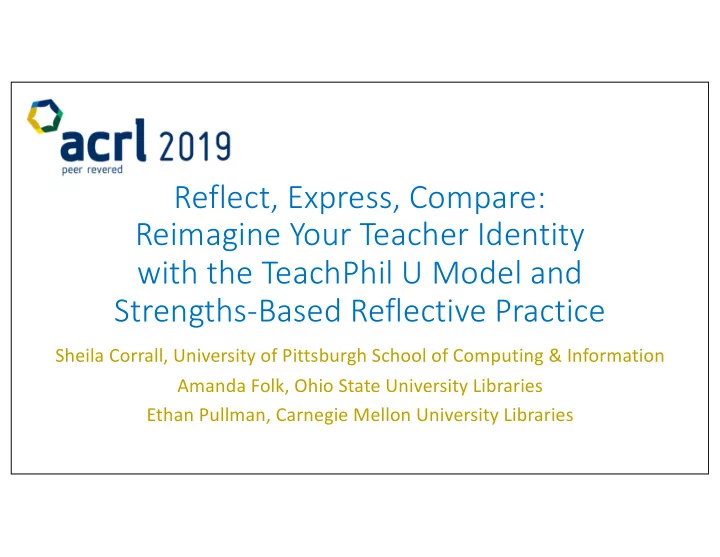

Reflect, Express, Compare: Reimagine Your Teacher Identity with the TeachPhil U Model and Strengths-Based Reflective Practice Sheila Corrall, University of Pittsburgh School of Computing & Information Amanda Folk, Ohio State University Libraries Ethan Pullman, Carnegie Mellon University Libraries
Reflect, Express, Compare: Reimagine Your Teacher Identity… Session outline • Introductions and orientation to the subject matter (20 mins.) • Instructions for group work and selection of entry-points (10 mins.) • Facilitated practical work in small groups (60 mins.) • Comfort/refreshment break (10 mins.) • Facilitated practical work in small groups (60 mins.) • Final reflection and plenary discussion (20 mins.)
Teaching Philosophy Statements “a purposeful and reflective essay… that includes not only one’s beliefs about the teaching and learning process, but also concrete examples of the ways in which he or she enacts these beliefs in the classroom. At its best, a Teaching Statement gives a clear and unique portrait of the author as a teacher, avoiding generic or empty philosophical statements about teaching” (Vanderbilt University, Center for Teaching) “a concise, compelling illustration of you as an instructor, a useful reflexive examination of your teaching” (University of Pittsburgh, Center for Teaching and Learning)
Process and Content Trigger questions are often used to facilitate reflection and discussion, e.g., • Developed through What will learners gain individual reflection, but from working with you? often with peer support Why do you teach and assess • Usually intended for sharing the way you do? with a wider audience How would you describe • Written in the first person, your approach as a teacher? typically 1-2 pages long Where do you focus • Should explain the context your teaching efforts? of your work and include Who influenced your teaching personal examples/refs. or inspired your learning?
Strengths-Based Reflective Practice “a new kind of reflective practice – one that explicitly emphasizes reflecting on strengths so as to identify them, play to them and develop new ones” (Ghaye, 2011, p. 66) Ø Developing an appreciative gaze Ø Reframing lived experience Ø Building practical wisdom Ø Achieving and moving forward
The Teaching Philosophy U Model • Applies concepts from organization development and strategic planning to the standard process of stepping through a set of reflective questions • Provides a flexible framework enabling teachers at different career stages to choose the entry-point to the process that best fits their level of competence and comfort in their teaching/learning support role, e.g., Ø Take the regular top-down route, moving from principles to practices Ø Begin with their concrete experiences of teaching (what they do and know) and work round towards more abstract concepts of pedagogy Ø Follow a middle-out path, starting with a particular personal interest (e.g., goals and objectives for learners, roles and relationships of teachers) • Promotes coherence and congruence by showing links among elements of teaching to improve consistency between stated principles and practices
Four Core Questions, Two Supplementaries • Who or what has influenced, informed or inspired your approach to teaching and supporting learning? [Warm-up] • What are your assumptions and beliefs about the processes of learning and teaching including the roles of teachers and learners? • What are your goals and objectives for the learners you work with? • What is your style of teaching or learning facilitation? • What are your teaching, learning, assessment and evaluation practices and methods? • What metaphor could you use to describe your teaching role to someone outside the education field? [Wrap-up]
(Espoused theory) (Theory in use ) G E N What are your What are your E What kind of Beliefs about Teaching, Learning R Teaching and and Assessment A Teacher are You? Learning? Practices? L T P What are your Influences What is your I L Goals for your Teaching Style? M A Learners? E N N Why? B Why? E How? How? Teach O D What? O What? Phil N D U Model THINKING DOING
Instructions for Group Work • You are expected to work through two core questions and one supplementary (the warm-up or wrap-up) in each one-hour block • Your will find fuller versions of the questions/prompts and supporting resources in Handout 2: Practical Guidance – available on your table and via the conference app or schedule, where you can also download a worksheet in Word format • For each question, you should Reflect individually on your response, Express your response in words (or images), then Compare notes • Also available online is Handout 1: Conceptual Overview, a PDF file containing the TeachPhil U Model, and a PDF copy of the slides https://s4.goeshow.com/acrl/national/2019/conference_schedule.cfm
Choose Your Own Pathway Where do you want to start? • What are your Beliefs about Teaching and Learning? • The TeachPhil U Model lets you decide where to begin your • What are your Goals for your philosophical journey Learners? • You can move round the model • What is your Teaching Style? anti-clockwise or clockwise, or • What are your Teaching, work outwards from the middle Learning and Assessment • So, which of the core questions Practices? do you find most inviting?
Final Reflection and Plenary Discussion • Reactions to the TeachPhil U model and process – would you use it again? – would you recommend it to others? – how could it be improved? • Opinions of the supporting handouts and additional resources – were any of the examples, models, tools, etc. particularly useful? – were there areas where you would have liked more guidance? • Evaluation of the session – what were your most important takeaways from the workshop? – how could we have improved your experience?
Sheila Corrall University of Pittsburgh Email scorrall@pitt.edu Amanda Folk Ohio State University Email folk68@osu.edu Ethan Pullman Carnegie Mellon University Email ethanp@cmu.edu
Recommend
More recommend